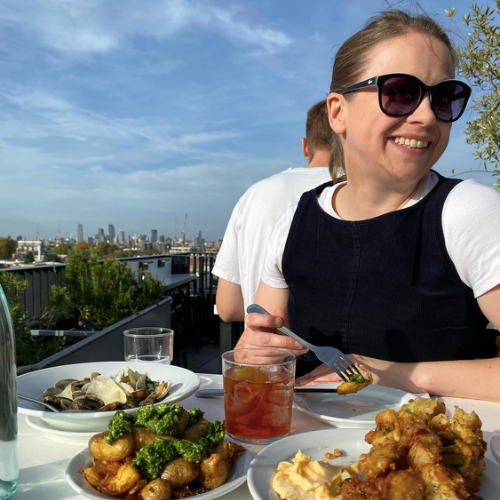Our Featured TM Pro Member today is Beth Harding, producer. 
Beth kindly gave us an insight into what it's like working at producer level and gave some fantastic advice and insights for anyone interested in a career in producing.
Why did you decide the editorial route was where you wanted to work?
I’ve never really had a masterplan, but I think I’ve always quite enjoyed entertaining people, without wanting anyone to actually look at me! So the editorial side is perfect. I get to combine words and images and music (and sometimes fireworks) to allow people to have a bit of a laugh, or learn something, or just escape their daily life for a bit, and that’s a huge privilege. I love the feeling of building a show from the ground up, whether that’s a one-off episode, a series, or a live event.
How did you get into producing?
I took the fairly standard route, starting out as a runner, then progressing to researcher. However, I did make a bit of a leap from researcher to producer without APing, it suited the job I was doing at the time but I wouldn’t necessarily recommend it. I think the more experience you can build up at every level, the better! For me, it makes you a better leader if you are able to appreciate what every member of your team has on their plate.
A few years ago, when I decided I wanted to take the leap into doing live events as a job, I took half a step back, taking AP positions that allowed me to use my existing skills at the same time as learning how events differ from broadcast roles. This obviously meant taking a cut in wages and dealing with a different level of responsibility, but it’s been 100% worth it, as I am now starting to be able to work in both areas, which is an absolute privilege.
How did you learn to be a producer? What skills do you need?
The hard way! No, but seriously – I’ve been incredibly lucky to work with some fantastic people throughout my career, and I’ve tried to watch how they do their jobs and learn from them. I’ve also seen it done very badly, and (hopefully) learned how not to do it.
In live TV you need to be flexible, tolerant and fairly unflappable. You need to make decisions quickly and sensibly. I think my record for tearing up a whole show and replacing it with something else is 15 seconds before on air. Don’t be precious about your work – it’s highly likely it will all change, and that’s no reflection on you, it’s just the nature of live programming. Accept criticism. Listen. Don’t shout (I’ve only ever shouted once in my working life – it was about sausages, don’t ask – and I instantly regretted it) Think laterally. And be kind.
What kinds of programmes do you work on?
I work predominantly in live TV and sports events. Once or twice a year I do pre-recorded stuff, and I am happy to keep things as varied as possible! I’ve done plenty of current affairs and news, as well as sports events, comedy, gameshows and even a reality dating show.
What are the most challenging projects to work on?
As with every type of TV, it feels like budgets are getting smaller and we’re trying to squeeze more out of less – that’s definitely a challenge. The other type of project I find tough is one where there’s no clear leadership or plan.
Speaking about the live sector specifically, I think that there is a tendency to expect that things will just happen and miracles will be worked in a very short amount of time and at ridiculous hours of the day. I’ll always try, and ask my team to try, but we really do need to get better at managing expectations!
What would be your advice to someone trying to get into your area of expertise?
Boring but:
Listen
Ask questions (don’t guess!)
Be patient
Pull your weight
And pay attention to the world around you
This feels like filling out a dating profile now.
What’s your best TV life hack?
Boring again, but – write it down! (it doesn’t have to be with a pen, online will do, I’m not that old) There’ll always be that moment where you go, “I know I’ve worked with a great…” or, “there’s a website/company that’s really helpful if you need to…” – and if you’ve got a great list of contacts, it’ll make your life so much easier. Hopefully they’re doing the same thing too, and you will be someone they think of.
Also, snacks are pretty much always the key.
Why do you like using Talent Manager?
The main benefit for me, as a Pro member, is being able to see who is recruiting and being able to get your profile to them as soon as possible. We all know how quickly hiring can be done in the TV industry, so being a member helps you to feel like you’re doing what you can to be “in the shop window” and get considered for roles.
*****
Thanks for sharing your answers with us! Connect with Beth's TM profile here - she is available for work from Monday 23rd January 2023.



